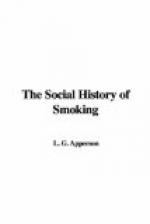Notwithstanding the unfashionableness of tobacco, there were still some noteworthy smokers to be found among the clergy. Dr. Sumner, head master of Harrow, who died in 1771, was devoted to his pipe. The greatest of clerical “tobacconists” of late eighteenth century and early nineteenth century date was the once famous Dr. Parr. It was from him that Dr. Sumner learned to smoke. When he and Parr got together Sumner was in the habit of refilling his pipe again and again in such a way as to be unobserved, at the same time begging Parr not to depart till he had finished his pipe, in order that he might detain him, we are told, in the evening as long as possible.
Parr was not a model smoker. He was brutally overbearing towards other folk, and would accept no invitation except on the understanding that he might smoke when and where he liked. It was his invariable practice, wherever he might be visiting, to smoke a pipe as soon as he had got out of bed. His biographer says—“The ladies were obliged to bear his tobacco, or to give up his company; and at Hatton (1786-1825) now and then he was the tyrant of the fireside.” Parr was capable of smoking twenty pipes in an evening, and described himself as “rolling volcanic fumes of tobacco to the ceiling” while he worked at his desk. At a dinner which was given at Trinity College, Cambridge, to the Duke of Gloucester, as Chancellor of the University, when the cloth was removed, Parr at once started his pipe and began, says one who was present, “blowing a cloud into the faces of his neighbours, much to their annoyance, and causing royalty to sneeze by the stimulating stench of mundungus.” It is surprising that people were willing to put up with such bad manners as Parr was accustomed to exhibit; but his reputation was then great, and he traded upon it.
Parr is said on one occasion to have called for a pipe after taking a meal at a coaching-inn called the “Bush” at Bristol, when the waiter told him that smoking was not allowed at the Bush. Parr persisted, but the authorities at the inn were firm in their refusal to allow anything so vulgar as smoking on their premises, whereupon Parr is said to have exclaimed: “Why, man, I’ve smoked in the dining-room of every nobleman in England. The Duchess of Devonshire said I could smoke in every room in her house but her dressing-room, and here, in this dirty public-house of Bristol you forbid smoking! Amazing! Bring me my bill.” The learned doctor exaggerated no doubt as regards the facilities given him for smoking; for it was his overbearing way not to ask for leave to smoke, but to smoke wherever he went, whether invited to do so or not; but the story shows the prejudice against smoking which was found in many places as a result of the attitude of the fashionable world towards tobacco.




